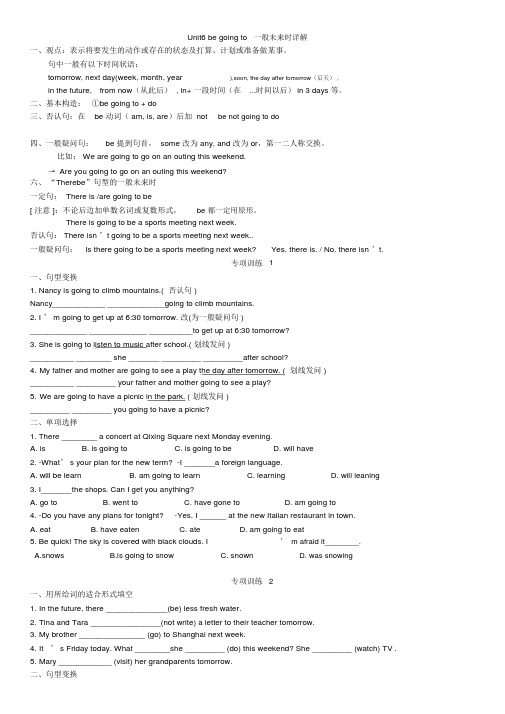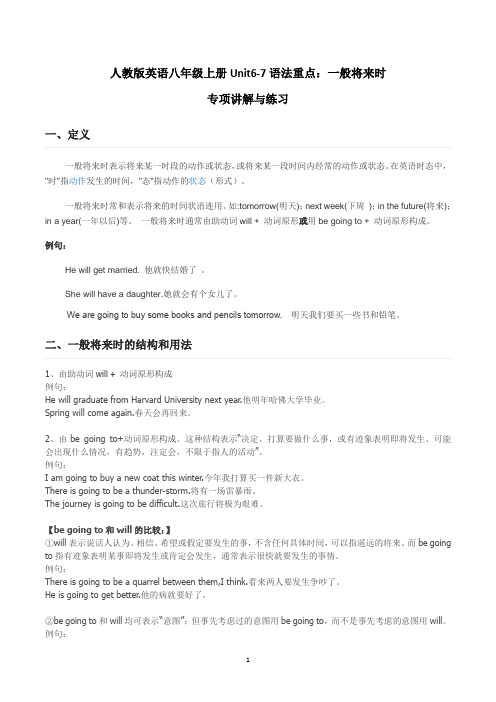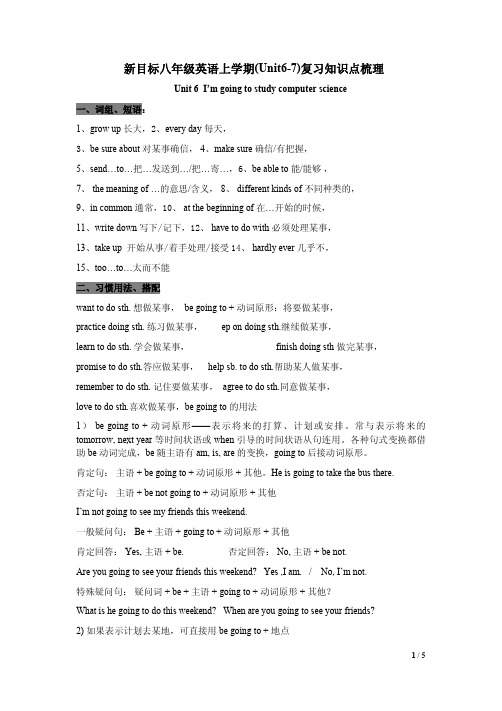八年级上册英语语法unit6-7一般将来时-(3407)
人教版英语八年级上册语法专练:一般将来时( UNIT 6~UNIT 7)

初中英语学习材料madeofjingetieji语法专练:一般将来时( UNIT 6~UNIT 7)一、单项选择( )1.( 2015宁夏) Do you think____a meeting tomorrow afternoon?A. is thereB.there isC.there wasD. there is going to be( )2. --What's your plan for the new term?--I ____to swim.A.will be learnB.am going Io learnC.learningD.learned( )3. (2015.湖北黄石)I fell in love with Shanghai on my first mp, so I decide I ____ in in 10 years.A. will liveB.livesC.livedD.has lived( )4.If there____no buying and selling of animals, there will be no killing in nature.A. isB.will beC.hasD.will have( )5. We____for a picnic if it____rain this Sunday.A. go; doesn'tB.will go; won'tC.will go; doesn'tD.go; won't( )6. --Do you have any plans for tomorrow? --Yes, I_______ a basketball match.A. watchB.have watchedC.watchedD.am going to watch( )7. (2015-云南)-Summer holiday is coming. What are you going to do?-I'm not sure. Maybe I _______ to the beach.A. goB.wentC.will goD.have gone( )8. I think the students____at home on computers;n 2020.A. studiedB.will studyC.studyD.studies( )9. _______a big party in our school in two weeks.A. It isB.It will beC.There wasD.There is going to he( )10.(2014.黑龙江绥化)Jenny____on holiday now.l wonder when she ____ back.A.is being; comesB.is; is comingC.will he; will come二、用所给词的适当形式填空I. Today is a sunny day. We ___________ (have)a picnic this afternoon.2. My brother _______ (go) to Shanghai next week.3. Tom often _______(go)to school on foot. But he _______ (go) to school by bus next Friday.4. There _______ (be)a meeting in our school tomorrow afternoon.三、根据汉语意思完成句子l.我打算明天和朋友们去野餐。
人教版英语八年级上册Unit6一般将来时语法详解及练习

Unit6 be going to一般未来时详解一、观点:表示将要发生的动作或存在的状态及打算、计划或准备做某事。
句中一般有以下时间状语:tomorrow, next day(week, month, year),soon, the day after tomorrow(后天) , in the future, from now(从此后) , in+ 一段时间(在...时间以后) in 3 days 等。
二、基本构造:①be going to + do三、否认句:在be 动词( am, is, are)后加 not be not going to do四、一般疑问句:be 提到句首, some 改为 any, and 改为 or,第一二人称交换。
比如: We are going to go on an outing this weekend.→Are you going to go on an outing this weekend?六、“Therebe”句型的一般未来时一定句: There is /are going to be[ 注意 ]:不论后边加单数名词或复数形式,be 都一定用原形。
There is going to be a sports meeting next week.否认句: There isn ’t going to be a sports meeting next week..一般疑问句:Is there going to be a sports meeting next week?专项训练一、句型变换Yes, there is. / No, there isn ’t. 11. Nancy is going to climb mountains.( 否认句 )Nancy____________ _____________going to climb mountains.2. I ’ m going to get up at 6:30 tomorrow. 改(为一般疑问句 )_____________ _____________ __________to get up at 6:30 tomorrow?3. She is going to listen to music after school.( 划线发问 )__________ ________ she _______ _________ _________after school?4.My father and mother are going to see a play the day after tomorrow. ( 划线发问 )__________ _________ your father and mother going to see a play?5.We are going to have a picnic in the park. ( 划线发问 )_________ _________ you going to have a picnic?二、单项选择1. There ________ a concert at Qixing Square next Monday evening.A. isB. is going toC. is going to beD. will have2. -What’ s your plan for the new term? -I _______a foreign language.A. will be learnB. am going to learnC. learningD. will leaning3. I_______the shops. Can I get you anything?A. go toB. went toC. have gone toD. am going to4. -Do you have any plans for tonight? -Yes, I ______ at the new Italian restaurant in town.A. eatB. have eatenC. ateD. am going to eat5. Be quick! The sky is covered with black clouds. I’ m afraid it________.A.snowsB.is going to snowC. snownD. was snowing专项训练 2一、用所给词的适合形式填空1.In the future, there ______________(be) less fresh water.2.Tina and Tara ________________(not write) a letter to their teacher tomorrow.3.My brother _______________ (go) to Shanghai next week.4.It ’ s Friday today. What ________she _________ (do) this weekend? She _________ (watch) TV .5.Mary ____________ (visit) her grandparents tomorrow.二、句型变换1. Ken is going to keep on writing stories. ( 否认句、一般疑问句、发问Ken _________ _________ going to keep on writing stories._________ Ken ___________ to keep on writing stories?__________ _________ Ken going to ____________?)三、单项选择((((((( () 1. Ann____ mountains tomorrow morning. A. is going to climb B.climb C.climbs D.is climbing ) 2. The girl ______ a new computer for herself next year.A. buyB. buysC. boughtD. is going to buy) 3. ---_______ on Sunday? ---She is going to take guitar lessons.A. What does she doB. When is she going to take guitar lessonsC. How is she going to doD. What is she going to do) 4. My brother is going to _______ an engineer when he ________ up.A. do; growB. do; growsC. be; growD. be; grows)5. My brother is going to _______ a cook when he _______ up.A. do; growB. do; growsC. be; growD. be; grows) 6. What _____ you _____ to do when you _____ high school?A. do; want; finishB. will; want; finishC. are; going; are going to finishD. are; want; are going to finish) 7.The day after tomorrow they ________ a volleyball match.A. will watchingB. watchesC. is watchingD. is going to watch)8. There's going to ____ in tomorrow's newspapers.A. have something newB. have new somethingC. be something newD. be new something。
人教版八年级英语核心语法考点归纳

人教版八年级英语核心语法考点归纳八年级上册Unit 1考点一:复合不定代词复合不定代词由some, any, no, every 与one, body, thing 构成。
在使用复合不定代词时应注意以下几点:1. some- 一般用于肯定句中,any- 一般用于否定句或疑问句中,在表示请求、建议或期望得到肯定回答时,常用some- 构成的复合不定代词;2. 复合不定代词作主语时按单数看待;3. 形容词或else 修饰复合不定代词的时候应后置。
考点二:一般过去时定义:一般过去时表示过去某个时间发生的动作或存在的状态,也可表示过去经常发生的习惯性的动作或行为。
结构:主语+ 动词过去式+ 其他;主语+was / were + 其他。
常用时见壮语:yesterday, two years ago, last week, just now 等。
1.The old man _____ in Shanghai, but he _____ in Haikou now.A.be born; liveB.was born ; liveC.is born; livesD.was born; lives2. —Where were you last Saturday?—I ____ in the Capital Museum.A. amB. will beC. wasD. have been八年级上册Unit 2考点一:拼读副词频度副词表示动作或行为发生的频率。
常见的频度副词及其发生的频率如下表:考点二:how 疑问词组练一练3.()do you usually go to school,Simon? -by bike.A.WhenB.HowC.WhatD.Where(答案在文末获取)八年级上册Unit 3考点一:形容词和副词的比较级形容词和副词的比较能表示两者之间的比较关系,表示A 比B 更……,通常用than 来连接。
人教版英语八年级上册Unit7一般将来时语法详解及练习

Unit7 will一般将来时详解一、概念:表示将要发生的动作或存在的状态及打算、计划或准备做某事。
句中一般有以下时间状语:tomorrow, next day(week, month, year…),soon, the day after tomorrow(后天),in the future, from now(从今后),in+一段时间(在...时间之后)in 3 days 等。
二、基本结构:②will+ do.三、否定句:will后加not成will not =won’t。
will not=won’t四、一般疑问句:will提到句首,some改为any, and改为or,第一二人称互换。
五、同义句:be going to = willI am going to go swimming tomorrow. = I will go swimming tomorrow.六、“There be”句型的一般将来时肯定句:There will be+名词=There is/are going to be[注意]:无论后面加单数名词或复数形式,be都必须用原形。
There will be only one country.否定句:There won’t be only one country.一般疑问句:Will there be only one country?Yes,there will./No,there won’t.专项训练1一、单项选择1. I hope you ________a good time this evening.A. haveB. are havingC. will haveD. has2. There________ a basketball match this afternoon.A. will haveB. will beC. hasD. have3. We________to the park if it is fine tomorrow.A. will goB. goC. goesD. went4. The kids may not go to school in the future. They ________at home on computers.A. have studiedB.will studyC. studiedD. studies5. -Shall we hang out in Great Bazzar tomorrow?-I’m afraid not. ________the final game of the World Cup on TV.A. There isB. There will beC. There will haveD. There is going to have二、句型转换1. Students will go to school in the future.(一般疑问句) ________ _______ _______ to school in the future?2.There will be some robots in our homes.(否定句) There _______ ______ _______robots in our homes.3.My sister will go camping with her friends.(否定句) My sister ________ _______camping with her friends.4.Mike will visit his grandparents next weekend.(一般疑问句,肯定回答)_______Mike_______his grandparents next weekend? Yes, ________ _______.5.There will be more wild animals in the forest.(一般疑问句,否定回答)______ _____ ______more wild animals in the forest? No, _______ _______.专项训练2( ) 1. If they come, we ________ a meeting. A. have B. will have C. had D. would have ( ) 2. He ________ her a beautiful hat on her next birthday.A. givesB. gaveC. will givingD. is going to giving( ) 3. He ________ in three days.A. coming backB. came backC. will come backD. is going to coming back( ) 4. ________ a concert next Saturday?A. There will beB. Will there beC. There can beD. There are( ) 5. There ________ a birthday party this Sunday.A. shall beB. will beC. shall going to beD. will going( )7. There ___ a talk show on CCTV 3 at eight tonight.A. will haveB. is going to beC. is havingD. is going to have( )8. I ________ free the day after tomorrow. A. will B. will C. will be D. will am ( ) 9. Mother ________ me a nice present on my next birthday.A. will givesB. will giveC. givesD. give1. Andy will start working when she finishes high school and college.(否定句、一般疑问句、提问)Andy _________ _________ start working when she finishes high school and college.________ Andy _______ working when she finishes high school and college?________ _______ Andy ________ working?2. We will meet at the bus stop at 10:30.(改一般疑问句)_______ ________ meet at the bus stop at 10:30?。
人教版八上英语Unit6 知识点归纳

八上Unit6 知识点归纳语法: 一般将来时含义:表示将来某个时间要发生的动作或存在的状态,也表示将来经常或反复发生的动作,成语表示将来的时间状语连用。
构成:主语+be going to+动词原形(表示将要发生的动作或安排,计划、打算、决定要做的事)时间状语(标志词): tomorrow, next, in the future, in+段时间eg: The Smiths are going to see a movie this evening.They are going to play volleyball next week.一般疑问句: be动词提前eg: Are the Smiths going to see a movie this evening?Are they going to play volleyball next week?否定句: be动词后加noteg: The Smiths aren't going to see a movie this evening.They aren't going to play volleyball next week.划线提问:1. The Smiths are going to see a movie this evening.When are the Smiths going to see a movie?2. The smiths are going to see a movie this evening.What are the Smith going to do this evening?3. The smiths are going to see a movie this evening.Who are going to see the movie this evening.知识点:1. grow up 长大, 成长eg: I want to be a teacher when I grow up.2. computer programmer 计算机程序设计员eg: I want to be a computer programmer.3. violin n. 小提琴violinist n. 小提琴手4. drive v. 开车driver n. 司机5. piano n. 钢琴pianist n. 钢琴家6. science n. 科学scientist n. 科学家7. be sure about 确信, 对...有把握eg: I'm sure about the answer.8. make sure 确保,查明eg: Don't worry, the policeman can make sure our safety. 不用担心, 警察可以确保我们的安全。
Unit6-7+一般将来时教案++2023-2024学年人教版八年级英语上册

Unit6-7一般将来时教案人教版英语八年级上册一、教学目标:1.学习运用所学的知识来陈述自己对将来的看法;学会谈论自己的对将来的预言。
掌握情态动词will来表达一般将来时态这一语法知识;2. 通过引导学生展望未来,及对未来生活的设计,来达到前景教育的目的,同时也通过对前景的设想,让学生在潜移默化中反省自己的现状,使之对目前的学习、生活习惯作适当的调整,并不断的改善自己的现状,使学生的理想观和价值观更为科学,更具发展价值。
二、教学重难点1. 教学重点:1) 进一步学习运用所学的知识来陈述自己对将来的看法;学会谈论自己的对将来的预言。
2) 掌握情态动词will来表达一般将来时态这一语法知识;并运用所学的知识来表达将来的活动。
2. 教学难点:掌握情态动词will来表达一般将来时态这一语法知识;三、教学过程Learning objectivesTo learn to use will + do.Kids will study at home on computers.Will people use money in 100 years?What will the future be like?To learn to use there will be.To be able to predict what a city in the future will be like with the words more, fewer, less.Ⅰ. Warming up and revision1. Have a dictation of the new words learned in the last class.2. Ask some Ss to give some predictions.T: What’s your predicti on about the future?S1: There will be less free time.S2:There will be more pollution.Ⅲ. Try to Find一、一般将来时态肯定式:主语+ will + 动词原形Kids will study at home on computers.孩子们将会在家里的电脑上学习。
人教版英语八年级上册 Unit6-7语法重点:一般将来时_专项讲解与练习 (有答案)

人教版英语八年级上册Unit6-7语法重点:一般将来时专项讲解与练习一般将来时表示将来某一时段的动作或状态,或将来某一段时间内经常的动作或状态。
在英语时态中,"时"指动作发生的时间,"态"指动作的状态(形式)。
一般将来时常和表示将来的时间状语连用。
如:tomorrow(明天);next week(下周);in the future(将来);in a year(一年以后)等。
一般将来时通常由助动词will + 动词原形或用be going to + 动词原形构成。
例句:He will get married. 他就快结婚了。
She will have a daughter.她就会有个女儿了。
We are going to buy some books and pencils tomorrow. 明天我们要买一些书和铅笔。
1、由助动词will + 动词原形构成例句:He will graduate from Harvard University next year.他明年哈佛大学毕业。
Spring will come again.春天会再回来。
2、由be going to+动词原形构成。
这种结构表示“决定、打算要做什么事,或有迹象表明即将发生、可能会出现什么情况,有趋势,注定会,不限于指人的活动”。
例句:I am going to buy a new coat this winter.今年我打算买一件新大衣。
There is going to be a thunder-storm.将有一场雷暴雨。
The journey is going to be difficult.这次旅行将极为艰难。
【be going to和will的比较:】①will表示说话人认为、相信、希望或假定要发生的事,不含任何具体时间,可以指遥远的将来。
而be going to指有迹象表明某事即将发生或肯定会发生,通常表示很快就要发生的事情。
八年级英语上册一般将来时态

•主语 + shall \ will + 动词原形 + 其他
1、will 用于各种人称,shall 只能用于第一人称, be 随人称和数、时间的变化而变化,will 常省略
3、将来每个人都有一台计算机. Everyone will have a computer in the future.
4、我们将使用因特网在家里学习. We will use the Internet to study at home.
5、我理想的学校将有宽大的教室和图书室。
My dream school will have big classrooms and libraries.
6、学生将在电脑上与老师对话. Students will talk to their teachers on the computers.
7、将来有学校吗?不,没有 Will there be schools in the future? No, there won’t.
谢谢观赏!
1、there be 的将来时态表示 某处 将会有 2、there be 的将来时态的否定句表示 某处 将不 会有
肯定句:There will be +主语+其他
否定句:
There won’t be +主语+其他
疑问句:
疑问词+ Will +there + be + 主语 + 其他?
Yes, there + will
肯定句:主语 + be going to + 动词原形 + 其他
人教版英语八年级上册Unit 6-7Grammar一般将来时语法讲解+练习(含答案)

人教版八年级上册Unit 6 - 7 Grammar一般将来时姓名:_________定义表示将来某一时段的动作或状态;表示将来某一段时间内经常的动作或状态。
例:1)She will have a daughter. 她就快有个女儿了。
2)Call me this evening. I’ll be at home. 今晚给我打电话,我会在家。
结构英语时态通过谓语动词的变形来体现,一般将来时的谓语构成有以下几种情况:will + V原(该结构表示将来某个时间将要发生的动作或状态)【注1】will可以缩写为’ll,如:I will = I’ll he will = he’ll【注2】will不涉及第三人称单数的变形,只有一种形式,后面加动词原形。
例:I will visit Mr. Brown next week. 下周我将去拜访布朗先生。
He will go to Beijing next year. 他明年要去北京。
be going to + V原(该结构表示事先考虑过的将要发生的动作,或已有迹象表明将要发生的某事,意为“打算”、“就要”)例:There is going to be a basketball match tomorrow. 明天会有一场篮球比赛。
We’re going to go on vacation in Sanya this winter. 这个冬天我们计划去三亚度假。
There are lots of dark clouds. It is going to rain. 天上乌云密布,快要下雨了。
be doing,现在进行时表将来。
表示位置转移的动词(如go, come, leave, start, arrive等),可以用现在进行时表将来。
例:They’re leaving for Chongqing. 他们即将前往北京。
The bus is coming. 公交车就要来了。
八年级上册英语语法unit6-7一般将来时

一般将来时一.概念表示将要发生的动作或存在的状态及打算、计划或准备做某事二.标志tomorrow next day/week/month/year... soon by.... the day after tomorrow in+一段时间(in a few minutes)三.结构肯定:主语+am/is/are going to .......主语+will/shall do sth (shall 只用于第一人称即I/We shall ......,will可用于任何人称)否定:主语+am/is/are not going to .....主语+will/shall not do sth will not=won’t一般疑问句:am/is/are+主语going to ........?will/shall+主语do......?特殊疑问句:特殊疑问词+am/is/are+主语going to ........?特殊疑问词+will/shall+主语do......?四.用法1.用be doing表示将来:主要意义是表示按计划、安排即将发生的动作,常用于位置转移的动词。
如:go,come,leave,arrive等,也可用于其他动作动词。
We are having fish for dinner.We are moving to a different hotel the day after tomorrow.这种用法通常带有表示将来的时间状语,如果不带时间状语,则根据上下文可表示最近即将发生的动作。
A: Where are you going?B: I am going for a walk.A:Are you coming with me?A: Yes,I am just coming. Wait for me.2.用be going to do表示将来:主要意义,一是表示“意图”,即打算在最近的将来或将来进行某事。
人教版八年级英语上册Unit7一般将来时态及其用法

I will go to work by car.
0 2 一般将来时态的结构
0 3 一般将来时态的否定句
0 4 一般将来时态的一般疑问句及答语
0 5 一般将来时态的特殊疑问句
Thank you !
3. The students __________(come) back to school in three
w e eWk si.l l
b
Ⅱ. 句型转换 e
1. They w illwboen 'att hogmoe to night.
will they
(改为一般疑问句并补全肯定答语)
—H__o_w___sotohney w__il_l _ at home tonight?
your uncle
t his Sun day ? w hat 对动作、物体或事件提问,
表示“什么”
4. AliHcoew ws oiloln go to work in a week .
h o w 对方式提问,表示“怎样”
will Alice go to work?
h o w s o o n 对 ”in +时间段”
homes.
lt
2. Everything will bwe ofnre'et.
Everything
be free.
知识讲解
(四)一般将来时态的一般疑问句及答语
例句赏析:
新目标八年级英语上学期(Unit6-7)复习知识点梳理

新目标八年级英语上学期(Unit6-7)复习知识点梳理Unit6I’m going to study computer science一、词组、短语:1、grow up长大,2、every day每天,3、be sure about对某事确信,4、make sure确信/有把握,5、send…to…把…发送到…/把…寄…,6、be able to能/能够,7、the meaning of…的意思/含义,8、different kinds of不同种类的,9、in common通常,10、at the beginning of在…开始的时候,11、write down写下/记下,12、have to do with必须处理某事,13、take up开始从事/着手处理/接受14、hardly ever几乎不,15、too…to…太而不能二、习惯用法、搭配want to do sth.想做某事,be going to+动词原形:将要做某事,practice doing sth.练习做某事,ep on doing sth.继续做某事,learn to do sth.学会做某事,finish doing sth做完某事,promise to do sth.答应做某事,help sb.to do sth.帮助某人做某事,remember to do sth.记住要做某事,agree to do sth.同意做某事,love to do sth.喜欢做某事,be going to的用法1)be going to+动词原形——表示将来的打算、计划或安排。
常与表示将来的tomorrow,next year等时间状语或when引导的时间状语从句连用。
各种句式变换都借助be动词完成,be随主语有am,is,are的变换,going to后接动词原形。
肯定句:主语+be going to+动词原形+其他。
He is going to take the bus there.否定句:主语+be not going to+动词原形+其他I’m not going to see my friends this weekend.一般疑问句:Be+主语+going to+动词原形+其他肯定回答:Yes,主语+be.否定回答:No,主语+be not.Are you going to see your friends this weekend?Yes,I am./No,I’m not.特殊疑问句:疑问词+be+主语+going to+动词原形+其他?What is he going to do this weekend?When are you going to see your friends?2)如果表示计划去某地,可直接用be going to+地点We are going to Beijing for a holiday.3)表示位置移动的动词,如go,come,leave等常用进行时表示将来。
人教版8年级上 第六、七单元小结

第六单元I am going to study computer science.一、语法点1.一般将来时(1)定义及特征表将来即将发生,还未发生的状态。
通常表将来的时间状语连用,tomorrow/next week/soon/in a few days等。
(2)主要形式①助动词will+VEg.we don’t leave before 9 o’clock.在疑问句中,当主语是第一人称(I或we)时,一般将来时的助动词用shall. Eg.what time shall we leave?What shall we do in our English class tomorrow.②be going to+VEg.I am going to do my homework this evening.Who is going to speak first?③there is going to beEg.(3)特殊情形①表示位置转移的动词(如:leave/start/come/go等),可用现在进行时表示将来时。
②在时间状语和条件状语从句中,用一般现在时表将来。
Eg.I will give the note to him as soon as he comes back.Uncle Wang is coming③be going to 和will +V的区别2.May的用法表示推测,相当于汉语的“可能;或许;大概”之意。
May比can的可能性还低。
May的否定是may not.例句:You may be right this time, but I’m not sure.3.when引导的时间状语从句表达when “当……时”, when 引导的时间状语从句,从句用一般现在时,主句用一般将来时(主将从现)。
What do you want to be when you grow up? 长大后你想做什么?She is going to be an astronaut when she grows up.她长大后打算当一名宇航员。
人教版英语八年级上册 Unit6-7语法重点:一般将来时_专项讲解与练习 (有答案)

人教版英语八年级上册Unit6-7语法重点:一般将来时专项讲解与练习一般将来时表示将来某一时段的动作或状态,或将来某一段时间内经常的动作或状态。
在英语时态中,"时"指动作发生的时间,"态"指动作的状态(形式)。
一般将来时常和表示将来的时间状语连用。
如:tomorrow(明天);next week(下周);in the future(将来);in a year(一年以后)等。
一般将来时通常由助动词will + 动词原形或用be going to + 动词原形构成。
例句:He will get married. 他就快结婚了。
She will have a daughter.她就会有个女儿了。
We are going to buy some books and pencils tomorrow. 明天我们要买一些书和铅笔。
1、由助动词will + 动词原形构成例句:He will graduate from Harvard University next year.他明年哈佛大学毕业。
Spring will come again.春天会再回来。
2、由be going to+动词原形构成。
这种结构表示“决定、打算要做什么事,或有迹象表明即将发生、可能会出现什么情况,有趋势,注定会,不限于指人的活动”。
例句:I am going to buy a new coat this winter.今年我打算买一件新大衣。
There is going to be a thunder-storm.将有一场雷暴雨。
The journey is going to be difficult.这次旅行将极为艰难。
【be going to和will的比较:】①will表示说话人认为、相信、希望或假定要发生的事,不含任何具体时间,可以指遥远的将来。
而be going to指有迹象表明某事即将发生或肯定会发生,通常表示很快就要发生的事情。
新目标英语八年级上册unit7知识点总结

新目标英语八年级上册unit7知识点总结Unit7 Will people have roborts?Section A1.一般将来时(1)概念:一般将来时是表示将来某个时间将要发生的动作或存在的状态。
I am going to / shall watch a football match on TV this evening.今天晚上我将看一场足球比赛。
(2)结构①肯定式:主语+助动词will/shall +动词原形+其他(wil 用于各种人称,shall用于第一人称)=主语+ be going to +动词原形+其他will表示单纯将来概念,be going to强调事先经过考虑安排而计划或打算要做某事(意图)Are you going to post that letter?由某种迹象判断某事有可能发生(预见)It’s going to rain.②否定式:在will/shall/be后面加not.will not = won’t③一般疑问句:将XXX提到主语前面。
2.There be某地有某物它有不同时态。
(1)过去时态:There was/ were….表某地过去有某物(2)目前时态:There is/ are ….表某地目前有某物(3)将来时态:There will be …= There is/are going to be…表某地将有某物(4)句式①一般疑问句形式:Will there be +主语+其他。
②一定回答:Yes, there will.否定回答是:No, XXX’t.③否定形式:XXX其他,将不会有……④特殊疑问句:疑问词/词组+一般疑问句?When will there be a nice match?何时会有一场精彩的球赛?(6) there be句型中不克不及用have\has(7) XXX表示某地存在某物强调的是客观存在着的东西。
have/has表示或人有某物,夸大所属关系。
八年级上册复习unit6-7

There will be more people. There will be more pollution.
There will be fewer trees.
There will be less free time.
第十一页,编辑于星期六:十八点 三十五分。
more 是 更多 的意思,后面可加不可数名
take acting lessons…
第一页,编辑于星期六:十八点 三十五分。
be going to是一般将来时的一种 表达方式,be包括am, is, are,之后 接动词原形,一般表示事先打算做 的事或表示预测要发生的事情。
第二页,编辑于星期六:十八点 三十五分。
句型结构
肯定句: 主语 + be (am, is, are) + going to + 动词原 形 + 其他
I am going to work in Beijing next year.
我打算明年在北京工作。 否定句: 主语 + be (am, is, are) + not + going to + 动 词原形 + 其他 I am not going to learn basketball. 我不打算学篮球了。
1. --- Will you watch a football match this 1e.vWene iwngil?l watch a football match this
2-.-- Yevees,nwineg.w(i改ll.为一般疑问句并作肯定回答)
22.. H---eWwill hteellteallsatosorrorwo.w? (改-为-- 一No般, h疑e w问o句n’t并. 作否定回答) 33.. SShhee wwiollnw’torwkohrakrhdaartdEantgElisnhgtlihsihs ttehrismt.erm. (改为否定句) 44.. WThheasttuwdilelntthsewsitluldgeontosndao tirnipfivine dfiavyes?days.
人教版新目标八年级上册Unit6-Grammar 一般将来时 课件

The evening class begins at 19:00. 晚课7点开始。 The train starts at two. 火车两点出发.
4.be about to do
表示正要做…,马上要做... (不能与表示将来的时间状语连用) 特殊句式:was /were about to do … when…
正要…突然发生…
英语晚会即将开始。 The English Evening Party is about to begin. 我正要出去,这时下起了雨. I was about to go out when it began to rain.
She is going to have a party next week.
They are going to play football this afternoon.
句子变为否定句时,在be 或 will 后,加上否定词 not
即,be not going to 、 will not
I am not going to study science next term.
basketball.
play
Is
going to
weekend
3)你妈妈这is个周末去i购s g物oin吗g ?to是,她要去买一些水果。
---
your mother
go shopping
this
?
改写句子
[全]人教版八年级英语上Unit6重点语法详解
![[全]人教版八年级英语上Unit6重点语法详解](https://img.taocdn.com/s3/m/f724363daef8941ea76e05e3.png)
人教版八年级英语上Unit6重点语法详解be going to句型一般将来时是从现在看将来某个时间将要发生的动作或存在的状态,也表示经常或反复发生的动作。
be going to do 是将来时态中最为常见的一种形式,它是一个固定结构,be的形式应与主语保持一致,且be going to 后一定接动词原形。
to是动词不定式符号。
它的形式是现在进行时,但表达的含义确实将来的动作或状态。
( 1 ) be going to do sth.意为"打算做某事",表示主观上打算或准备在最近或将来某时要做某事,与表示将来的时间状语连用。
We are going to visit the Great Wall next Sunday.( 2 ) be going to do sth. 只表示主观上判断客观上要发生的事,但不表示客观上必然发生的事。
此时往往表示从现在的迹象表明将来要发生的事情。
Look at these clouds. It's going to rain.( 3 ) be going to 后接地点,表示"打算去某处"。
后接副词时,应省略to。
Li Fei is going home/ there.( 4 ) 如果表示某地将有什么,那就得用there is/ are going to be, 表示将来存在的"有",be going to之后接动词原形be,决不能用have/ has来代替be。
There is going to be a class meeting tomorrow.( 5 ) 否定句:be going to do 中,be后加not。
I am not going to do my homework today.一般疑问句:be going to do 中,将be 放在主语之前,going to do的位置与顺序不变。
- 1、下载文档前请自行甄别文档内容的完整性,平台不提供额外的编辑、内容补充、找答案等附加服务。
- 2、"仅部分预览"的文档,不可在线预览部分如存在完整性等问题,可反馈申请退款(可完整预览的文档不适用该条件!)。
- 3、如文档侵犯您的权益,请联系客服反馈,我们会尽快为您处理(人工客服工作时间:9:00-18:30)。
一般将来时一.概念表示将要发生的动作或存在的状态及打算、计划或准备做某事二.标志tomorrow next day/week/month/year...soon by.... the day after tomorrow in+一段时间( in a few minutes)三.结构肯定:主语 +am/is/are going to .......主语 +will/shall do sth (shall 只用于第一人称即I/We shall ......,will 可用于任何人称 )否定:主语+am/is/are not going to .....主语 +will/shall not do sth will not=won’t一般疑问句: am/is/are+主语 going to ........?will/shall+主语 do......?特殊疑问句:特殊疑问词+am/is/are+主语 going to ........?特殊疑问词 +will/shall+主语 do......?四.用法1.用 be doing表示将来:主要意义是表示按计划、安排即将发生的动作,常用于位置转移的动词。
如: go,come,leave ,arrive等,也可用于其他动作动词。
We are having fish for dinner.We are moving to a different hotel the day after tomorrow.这种用法通常带有表示将来的时间状语,如果不带时间状语,则根据上下文可表示最近即将发生的动作。
A:Where are you going?B:I am going for a walk.A:Are you coming with me?A: Yes ,I am just coming. Wait for me.2.用 be going to do表示将来:主要意义,一是表示“意图”,即打算在最近的将来或将来进行某事。
Are you going to post that letter?How long is he going to stay here?I am going to book a ticket.另一意义是表示“预见” ,即现在已有迹象表明将要发生或即将发生某种情况。
It ’s going to rain.3. 用 will/ shall do表示将来:一是表示预见You will feel better after taking this medicine. Do you think it will rain?二是表示意图 .I will not lend the book to you.Take it easy,I will not do it any longer.基本结构: She will come to have class tomorrow.Will she come to have class tomorrow?She won’t come to have class tomorrow.What will she do tomorrow?一般将来时练习一、用所给动词的一般将来时填空1. I ______(leave )in a minute. I ______(finish)all my work before I ______(l eave ).2.—How long _____ you _____ (study )in our country?—I _____ (plan )to be here for about one more year.—I _____ (hope)to visit the other parts of your country.—What ______ you ______ (do)after you ______(leave)here?—I ______ (return )home and ______(get )a job.3.I ______ (be)tired. I ______(go)to bed early tonight.4.Mary ’s birthday is n ext Monday, her mother _____ (give )her a present.5.It is very cold these days. It ______(snow)soon.6.—_____ you _____(be)here this Saturday?—No. I ______(visit)myteacher.7.—______ I ______ (get )you a copy of today’s newspaper?—Thank you.8.I am afraid there ______(be)a meeting this afternoon. I can’t join you.9.Mike ______(believe,not )this until he ______(see)it with his own eyes.10. Most of us don ’t think their team ______(win ).二、单项选择1. There __________ a meeting tomorrow afternoon.A. will be going toB. will going to beC.is going to be D. will go to be2. Charlie ________ here next month.A. isn ’t workingB. doesn ’t workingC. isn ’t going to workingD. won’t work3. He ________ very busy this week, he ________ free next week.A. will be; isB. is; isC. will be; willbe D. is; will be4. There ________ a dolphin show in the zoo tomorrow evening.A. wasB. is going to haveC.willhave D. is going to be5.–________ you ________ free tomorrow?– No. I ________ free the day after tomorrow.A. Are; going to; willB. Are; going to be; willC. Are; going to; willbe D.Are; going to be; will be6. Mother ________ me a nice present on my next birthday.A. will givesB. will giveC. givesD. give7.– Shall I buy a cup of tea for you?–________. (不,不要。
)A. No, you won’tB. No, you aren ’t.C. No, please don’tD. No, please.8.–Where is the morning paper?–I ________ if for you at once.A. getB. am gettingC. to getD. will get9. ________ a concert next Saturday?A. There will beB. Will there beC. There canbe D. There are10. If they come, we ________ a meeting.A. haveB.will haveC.hadD. would have11. He ________ her a beautiful hat on her next birthday.A. givesB. gaveC. will givingD.is going to giving12. He ________ to us as soon as he gets there.A. writesB. has writtenC.will writeD. wrote13. He ________ in three days.A. coming backB. came backC. will comeback D. is going to coming back14. If it ________ tomorrow, we’ll go roller-skating.A. isn ’t rainB. won’t rainC. doesn’t rainD. doesn ’t fine15. – Will his parents go to see the Terra Cotta Warriors tomorrow?– No, ________ (不去) .A. they willn ’tB. they won’t.C. they aren ’tD. they don ’t.16. Who ________ we ________ swimming with tomorrow afternoon?A. will;goB. do; goC. will; goingD. shall; go17. We ________ the work this way next time.A. doB. will doC. going to doD.will doing18. Tomorrow he ________ a kite in the open air first,and then ________ boating in the park.A. will fly; will goB. will fly; goesC. is goingto fly; will goes D. flies; will go19. The day after tomorrow they ________ a volleyball match.A. will watchingB. watchesC.is watchingD. is going to watch20. There ________ a birthday party this Sunday.A. shall beB. will beC.shall going to beD. will going to be21. They ________ an English evening next Sunday.A. are havingB. are going to haveC.will havingD. is going to have22. ________ you ________ free next Sunday?A. Will;areB. Will;beC. Do; beD. Are; be23. He ________ there at ten tomorrow morning.A. willB. isC. will beD. be24. ________ your brother ________ a magazine from the library?A. Are; going to borrowB. Is; going to borrowC.Will; borrowsD. Are; going to borrows25.– Shall I come again tomorrow afternoon?–________ (好的) .A. Yes, pleaseB. Yes, you will.C.No, please D. No, you won ’t.26. It ________ the year of the horse next year.A. is going to beB. is going toC. will beD. will is27. ________ open the window?A. Will you pleaseB. Please will youC.You please D. Do you28. – Let ’s go out to play football, shall we?–OK. I ________.A.will comingB.be going to comeC. comeD. am coming29. It ________ us a long time to learn English well.A. takesB. will takeC. spendsD.will spend30. The train ________ at 11.A.going to arriveB.will be arriveC. is going toD. is arriving三、把下列各句译成英语1.我叔叔今晚要来。
